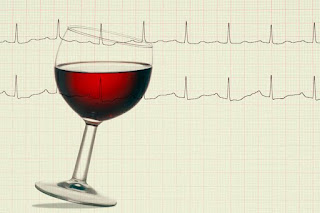Red Wine and Your Heart: Unveiling the Cardiovascular Benefits
Introduction:
The association between red wine consumption and heart health has been a topic of fascination and research for many years. Amidst the rich bouquet of flavors and aromas, red wine harbors compounds that may offer potential cardiovascular benefits. In this article, we'll explore the intriguing relationship between red wine and heart health, examining the scientific evidence and shedding light on the moderation that defines the key to unlocking these potential advantages.
The Heart-Healthy Compounds in Red Wine:
Red wine, particularly varieties like Cabernet Sauvignon, Merlot, and Pinot Noir, contains a unique blend of compounds that have garnered attention for their potential positive impact on heart health. One such compound is resveratrol, a polyphenol found in grape skins, which has antioxidant properties. Antioxidants play a crucial role in neutralizing free radicals, contributing to overall cellular health.
Moderate Red Wine Consumption and Heart Health:
Numerous studies suggest that moderate consumption of red wine may be associated with a lower risk of cardiovascular diseases. The key term here is "moderate." The American Heart Association defines moderate drinking as up to one drink per day for women and up to two drinks per day for men. Excessive alcohol consumption can have detrimental effects on health, including an increased risk of heart disease.
Blood Pressure and Cholesterol Regulation:
Resveratrol, in red wine, has been studied for its potential to promote heart health by helping regulate blood pressure and cholesterol levels. It may contribute to the dilation of blood vessels, improving blood flow and reducing the risk of clot formation. Additionally, some research suggests that moderate red wine consumption may raise levels of high-density lipoprotein (HDL or "good" cholesterol) while protecting low-density lipoprotein (LDL or "bad" cholesterol) from oxidation.
Inflammation and Arterial Health:
Chronic inflammation is a known factor in cardiovascular diseases. Red wine polyphenols, including resveratrol, have been explored for their anti-inflammatory properties. These compounds may help reduce inflammation, contributing to the maintenance of arterial health and flexibility.
The Importance of Moderation and Individual Differences:
While there is intriguing evidence suggesting potential cardiovascular benefits associated with red wine consumption, it's crucial to emphasize moderation. The health effects of alcohol can vary based on individual factors such as age, genetics, and overall health. Non-drinkers should not start consuming red wine solely for potential health benefits, and those with specific health conditions should consult with their healthcare providers.
Conclusion:
Red wine, with its rich history and complex flavors, may offer more than just a delightful sensory experience—it might contribute to heart health when consumed in moderation. The scientific exploration of the compounds found in red wine, particularly resveratrol, has opened avenues for understanding their potential cardiovascular benefits. However, the key takeaway remains moderation, as excessive alcohol consumption can have adverse effects on health. As with any health-related choices, consulting with healthcare professionals is paramount to making informed decisions about one's well-being.







Comments